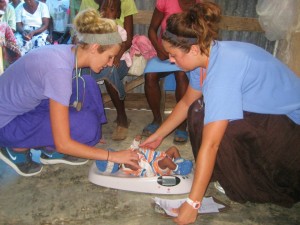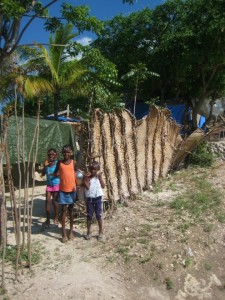Last month a group of Belmont faculty, staff and students took the opportunity to bring their skills and expertise “from here to Haiti.” On July 18, the group left Nashville for a week-long mission trip to Grand Goave, one of Haiti’s oldest cities, which suffered significant damage in the 2010 earthquake in that region. The trip evolved out of a task force created by the provost; Belmont has recently developed a partnership with the Cooperative Baptist Fellowship, which has a mission project in Haiti. This nursing trip was the first to take advantage of this partnership. In the future, the interdisciplinary task force hopes to organize trips for students in several other programs.
 Each day, the group was woken up by a rooster—lovingly nicknamed “El Diablo”—at approximately 3:30 a.m. “That bird was the bane of our existence,” claimed Assistant Professor of Nursing Sara Camp. They would then—after languishing in the heat for several more hours—meet with their contact, Judy, who is also a registered nurse and represents the Christian Baptist Fellowship. (At right – Senior Nursing students Charly Hood (right) and Reiley Heaberlin (left) tend to a baby at one of the mobile clinics.)
Each day, the group was woken up by a rooster—lovingly nicknamed “El Diablo”—at approximately 3:30 a.m. “That bird was the bane of our existence,” claimed Assistant Professor of Nursing Sara Camp. They would then—after languishing in the heat for several more hours—meet with their contact, Judy, who is also a registered nurse and represents the Christian Baptist Fellowship. (At right – Senior Nursing students Charly Hood (right) and Reiley Heaberlin (left) tend to a baby at one of the mobile clinics.)
The nursing students volunteered at a number of mobile clinics, which provided basic services such as vital sign checks and general diagnoses. Each clinic was able to see up to 50 people a day, and each day the staff and students quickly met their capacity. “This is their healthcare,” said Nursing Instructor Martha Ezell. “They can’t just go into Port Au Prince to see a doctor.”At the mobile clinics, the students checked vitals and compiled patients’ medical histories—a difficult task since many patients did not even know their own birthdays. The Belmont students were also able to assist Ezell and Camp with general assessments and distribute what medications were available. “[The Belmont students] got about a year’s worth of nursing in a week,” stated Ezell.
During the trip, the group performed a single home visit. “It was a dirt hut, smaller than [my office],” said Ezell. Senior nursing student Charly Hood recalled it having “just a bed, and a little bit of floor space.” The woman they visited was incredibly ill and on her death bed. All agreed that she would not live to the next year. Charly described the experience as something “[she] will never forget” and “difficult to put into words.”
 Both the students and faculty members were incredibly moved by the Haitians’ faith, which was present even in that small dirt hut. Not a single one of the patients would leave the clinic until they had prayed with Dr. Todd Lake, Belmont’s Vice President of Spiritual Development. When they prayed together in the clinic, there were no translators. They weren’t needed. “It didn’t matter. They believed in the words being prayed over them, even if they didn’t understand them,” said Ezell. ( At left – Some of the children play outside of the church the group visited.)
Both the students and faculty members were incredibly moved by the Haitians’ faith, which was present even in that small dirt hut. Not a single one of the patients would leave the clinic until they had prayed with Dr. Todd Lake, Belmont’s Vice President of Spiritual Development. When they prayed together in the clinic, there were no translators. They weren’t needed. “It didn’t matter. They believed in the words being prayed over them, even if they didn’t understand them,” said Ezell. ( At left – Some of the children play outside of the church the group visited.)
The entire group had the privilege of attending the local church, which, like everything else that week, proved to be a memorable experience. Once again, language barriers were not an issue, but there were unexpected surprises. Camp vividly recollects a dog, chicken, goat, lizard and “one other animal” present during the service.
Ezell recalls being particularly moved while praying the Lord’s Prayer: “The people truly do live by their faith. We say the Lord’s prayer, we say ‘give us this day our daily bread,’ but we don’t truly think about it. There, they really are praying for their daily bread.” Hood remarked that witnessing that kind of faith was the single most important aspect of the trip. “We think they have nothing, as privileged Americans, but they are so filled with joy. I think that was the most important thing to see.”
When asked if they would go back, Camp answered for all with a resounding “yes.” Her answer, however, came with a single stipulation: “Only if the rooster is gone.”
